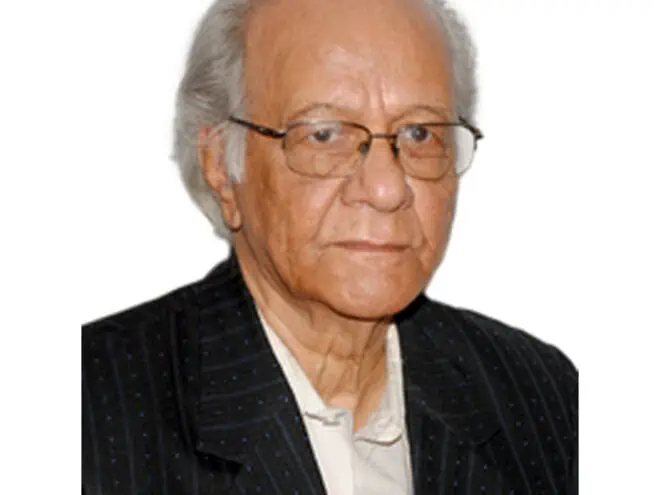
Anwar Moazzam, professor of Islamic Studies at Osmania University and a public intellectual, passed away on November 25 leaving a void in the Indian sub-continent that cannot be filled in a long time.
He is considered as last of the great souls Hyderabad has had. Many of these personalities have been gradually passing away. The last decade, if may say, was a time of tragedies striking Hyderabad incessantly.
Ziauddin Ahmad Shakeb died in London and Syed Sirajuddin who gave lectures on Allama Iqbal in Kashmir and wrote several books, are the only two among the top intellectuals I would like to mention here.
The next day of the passing away of Anwar Moazzam, Bazm e Sukhan, an online portal, while newspapers showed little interest, discussed his personality in detail.
Mohammad Zaheer, an acknowledged expert on Urdu literature, wrote in Bazm e Sukhan. He said, “as we notice, KarvaaN kyuN rukaa chalTe chalTe, kya koi phir luta raaste me (why did the caravan stop – while moving, is someone again robbed on the way?) is an epistrophe here that resounds in our mind even after we have finished reading the poem. “And it’s not just the words but their phonetic and metrical effect that resonates with us.
“Every thinking mind and feeling soul ever since the creation of humanity has raised this pervasive question — and it will continue to do so till the end of time. The agitated-ness of the human mind will find a soothing balm only in man’s imagination.
Writing further, he gives a brief explanation of some of the poem’s lines:
I
Raah tak tak ke zauq-e-nazar ki chup gae aankh se chaanD Taare
Chaandni intezaar-e-sahar me sorahi hai ufaq ke kinaare
Deep bujhne lage jalTe jalTe, karvaaN kyuN rukaa chalTe chalTe
The soulful yearning of a creative artist for appreciation of his creativity is evident in the first line.
The moonlight, absolutely aware of the transience of its existence, resting on twilight’s border, waiting to merge into the dawn, is a mesmerising scene that the second line creates.
The lamps abruptly dying out while burning, is, a reality that the third line brings home about impermanence of life.
II
“Qaafilaa mauTh ka jaarahaa hai zindagi ke kinaare kinaare
Dil andheroN ka ghabra raha hai jaane tooteNge ki…
It was Ashhar Farhan who posted the who posted an eulogy saying it would fit his end. This was titled as Fankar kee maut (death of an artiste). Farhan explained the poem was written in the marsiah (eulogy) tradition. “He recorded this for our friend Raza Mir a year ago,” Farhan explained.
In another post Zaheer explaines, “Epistrophe (literally meaning ‘to turn back upon’) is a powerful literary technique deployed to repeatedly carry certain words such that the reader is made to carry the words with him. As we notice, “KarvaaN kyuN rukaa chalTe chalTe, kya koi phir luta raaste me” (why did the caravan stop – while moving, is someone again robbed on the way?) is an epistrophe here that resounds in our mind even after we have finished reading the poem. And it’s not just the words but their phonetic and metrical effect that resonates with us.”
He says, “Every thinking mind and a feeling soul ever since the creation of humanity has raised this pervasive question and it will continue to do so till the end of time. The ‘agitatedness’ of the human mind will find a soothing balm only in man’s …
Responding to Shobhana, another member of the group he said, “The poem’s message will be lost on us if we allow ourselves to be ruled by the fear of death. We need to draw inspiration from Mo’azzam Saheb’s undaunting nerve to carry on with life despite his acute awareness of the reality of death. Our real tribute to Mo’azzam Saheb is not to give in to being part of what he calls ‘andhere’ who are afraid of this reality. Our real respect for him is to add radiance to the last flicker of life’s lamp – to add the last laughter to life before fizzling out.
vo habīb ho ki rahbar vo raqīb ho ki rahzan
jo dayār-e-dil se guzre use ham-kalām kar lo
vaqt jhūme kahīñ bahke kahīñ tham jaa.e kahīñ
khil uTheñ naqsh-e-qadam yuuñ koī dīvāna chale
shu.ūr-e-manzil-e-maqsūd bhī hai shart-e-safar
hujūm-e-rāh-ravāñ kārvāñ nahīñ hotā
“Awareness of death heightens your dance of life. Makes you focused, strong, undaunted, and radiant,” wrote another participant.
Amir Ullah Khan, an economist and a litterateur said, “That is the brilliant truth. Here is that void that cannot be filled.”
